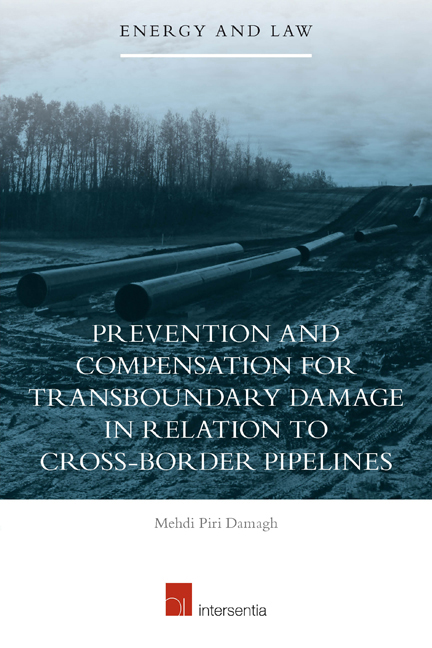Book contents
- Frontmatter
- Dedication
- Acknowledgements
- Contents
- Abbreviations
- List of Tables and Maps
- Chapter 1 Introduction
- PART I INTRODUCTORY ISSUES: PIPELINES, THE NATURE OF RISKS ASSOCIATED WITH PIPELINES AND THEIR REGULATORY REGIMES
- PART II PREVENTION OF CROSS-BORDER PIPELINE ACCIDENTS – MEANS AND SOURCES
- Introductory Note
- Chapter 5 Technical, Safety and Environmental Regulations
- Chapter 6 The Obligations to Prevent Trans-boundary Damage Caused by Crossborder Pipelines
- Chapter 7 An Evaluation of the Safety and Environmental Regulations of Crossborder Pipelines
- PART III STATE RESPONSIBILITY FOR TRANS-BOUNDARY DAMAGE CAUSED BY PIPELINES
- Summary
- Bibliography
- Valorisation Addendum
- Curriculum Vitae
Chapter 6 - The Obligations to Prevent Trans-boundary Damage Caused by Crossborder Pipelines
from PART II - PREVENTION OF CROSS-BORDER PIPELINE ACCIDENTS – MEANS AND SOURCES
Published online by Cambridge University Press: 13 December 2017
- Frontmatter
- Dedication
- Acknowledgements
- Contents
- Abbreviations
- List of Tables and Maps
- Chapter 1 Introduction
- PART I INTRODUCTORY ISSUES: PIPELINES, THE NATURE OF RISKS ASSOCIATED WITH PIPELINES AND THEIR REGULATORY REGIMES
- PART II PREVENTION OF CROSS-BORDER PIPELINE ACCIDENTS – MEANS AND SOURCES
- Introductory Note
- Chapter 5 Technical, Safety and Environmental Regulations
- Chapter 6 The Obligations to Prevent Trans-boundary Damage Caused by Crossborder Pipelines
- Chapter 7 An Evaluation of the Safety and Environmental Regulations of Crossborder Pipelines
- PART III STATE RESPONSIBILITY FOR TRANS-BOUNDARY DAMAGE CAUSED BY PIPELINES
- Summary
- Bibliography
- Valorisation Addendum
- Curriculum Vitae
Summary
INTRODUCTION
As described in detail a wide range of regulatory actions can be taken by actors to prevent oil and gas pipeline incidents. The implementation of these regulations in general depends on the legal regime and in particular on the obligations of states and the developers. Pipeline accidents may occur due to various causes of failures. Therefore a multilevel regulatory regime should be designed to address all causes of failures. At national level, the regulatory regime consists of private, public and co-regulations. These regulations are mainly aimed to deal with domestic pipelines. But as it was shown in Chapter 3, domestic pipelines may cause trans-boundary damage. This may raise a question whether such trans-boundary damage should also to be taken into account by national policy makers or whether supranational instruments should be adopted to address such trans-boundary damage. As briefly discussed in chapter 4, international instruments in general oblige states to prevent trans-boundary damage. In particular, there are regional instruments which directly require member parties to adopt certain preventive measures in order to prevent trans-boundary damage which may be caused by oil and gas pipelines. This is of course the regulatory regime for domestic pipelines. However, cross-border pipelines are a different story.
As sketched in Chapter 4, the legal regime of cross-border pipelines, applicable to trans-boundary damage is diverse enough to comprise treatybased obligations, general rules and principles of international law and even some national laws. The regulatory framework as a whole might seem scattered throughout different laws at different levels. This may blur the obligation to prevent such damage by using the best available instruments. It is worth mentioning that offshore cross-border pipelines which are laid in shared watercourses, continental shelves or high seas are to a large extent governed by rules of international law.
Safety and environmental standards which are used to prevent pipeline accidents were widely described in the previous chapter. In this section, on the basis of the legal regime described in Chapter 4, a specific question arises: who, and under what circumstances, has the responsibility to enforce these regulations? Basically states and pipeline operators are the prominent players in this field. Each one is subject to different rules and principles. Although states are the subject of international law, oil and gas developers are international actors which are not directly subject to international law.
- Type
- Chapter
- Information
- Prevention and Compensation for Transboundary Damage in Relation to Cross-border Oil and Gas Pipelines , pp. 233 - 288Publisher: IntersentiaPrint publication year: 2015

